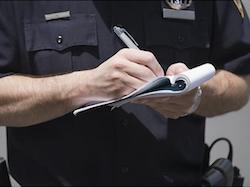Foreword: This short page is for ESL students who have trouble with the difference between the verbs notice and note.
The Meaning of the Verb Notice
My students sometimes make mistakes using the verb notice. Here are two example sentences.
- In the article, the author noticed that housing prices were increasing.
- The teacher noticed that several students were absent.
Which is correct? Number two only. Why? Well, let's look at the definition of the verb notice.
to notice = to become aware of something by seeing or hearing it; to perceive something; to observe something
So to notice something is to realize something new through your eyes (or ears). So, in sentence #2, the teacher looked out at the class, and (s)he saw that people were missing. This is something she noticed.
In sentence #1, what does the student say? Probably that the author stated, said, or mentioned something. This has a different meaning from notice, which is usually done with your eyes.

This cat has noticed an insect. What will happen next?
So what does the verb 'note' mean?
To note something is not something you do with your eyes; it is usually something you do with a pencil and a piece of paper. For example,
The policeman noted the car's license plate number.
You don't always need to have a pencil though. You can also make mental notes (with your mind). Another example,
The policeman noted that the man smelled like alcohol.
In both examples, the policeman may have written a note, or s/he may have just made a note in his/her mind. When we note something, we do it so we can remember it later.
This is why notes (a noun) are things that we write down; these are things we have noted, so we can read them later.

What is he noting? Or is he writing a ticket?
These are the most common definitions of notice and note. If you can understand the difference, you should be fine.
Confusing Point: Note and Notice are Synonyms in the Dictionary?
It is true that you can use the verb note in the same way you use notice. For example, the cat has noted an insect. / The cat has noticed the insect. However, this is a secondary meaning in my opinion, and most North Americans would say that the cat 'noticed the insect' to say that the cat has seen something new. If I were you, I would forget that note and notice can be synonyms -- keep them separated.
Key Point: While the verb to note can be used to mean to notice ( = to see/observe something new), what's important here is that to notice does not mean to write something down so you can remember it. That is to note something.
In Summary
to become aware of something by seeing it or hearing it = to notice it (most common), to note it (less common)
to write something down/make a note in your mind so you can remember it later = to note it
to state/say/tell someone something = to state/say/mention something
If you understood everything up to the confusing point above, then forget about the confusing point. They are not often used as synonyms; they have a different meaning in most cases.
Do you think you understand? Take the Notice/Note/Quiz!
1. The apartment manager the tenants that they needed to pay their rent on time.
2. The doctor the patient's symptoms in her notebook.
3. When I saw your car this morning, I didn't anything on it. However, when I went back later, there was a big scratch on its side.
4. Jane didn't want to forget where the building was, so she the address.
5. The company president that there would be a staff party to the end of the financial year. This announcement made everyone happy.
Answers
- 1-told (she told/stated this)
- 2-noted (she wrote them down; i.e. she made notes so she could read/remember them later)
- 3-notice (He didn't see it in the morning)
- 4-noted (She wrote it down or made a note in her mind so she would remember it later)
- 5-said (He announced it)
- Matthew Barton / Creator of Englishcurrent.com

That was a pretty nice and understandable explanation.
Thank you so much
I like how you explained it easy and simple
After this lesson, for me, there is no any confusing
It becomes a piece of cake now :)
Many thanks yo you
It was simple but we’ll explained. It was very helpful. I will recommend it to anyone anyday.
Thank you for your explanation, know you really make me to understand the distinction between noted with noticed.
Many thanks , you made it more than easy.
It has bothered me so long. Thank you for your simple and clear explanation.
Is it “Notice the two figures differ.” or “Note the two figures differ.”?
Both are possible. Is the speaker telling the audience to take a look visually at the differences? (this would be ‘notice’). Or is the speaker/writer asking the audience to make a note of it, e.g. to remember it for later?